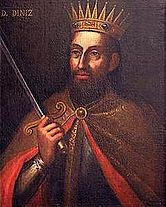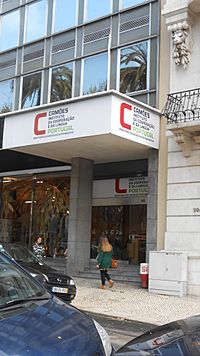Oliventine Portuguese facts for kids
Quick facts for kids Oliventine Portuguese |
|
|---|---|
| Português oliventino | |
| Native to | Portugal, Spain |
| Region | Olivenza, Táliga |
| Native speakers | 3,600 (no date) |
| Language family |
Indo-European
|
| Dialects |
Alentejan Portuguese Oliventine Portuguese
|
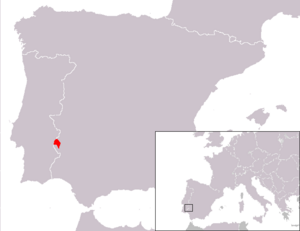 |
|
Oliventine Portuguese is a special kind of Portuguese language spoken in the towns of Olivença and Táliga in Spain. It's a unique version of Portuguese because it has been influenced by Spanish over many years.
Even though Spain controls this area, Portugal still believes it should be part of their country. Because of this long history and being separated from Portugal, Oliventine Portuguese is now a dying language. Only a few older people still speak it, and young people usually don't. In Táliga, it's hardly spoken at all anymore.
After the 1940s, most people stopped speaking Portuguese. This happened faster because of a policy in Spain that encouraged everyone to speak only Spanish.
Contents
A Look at History
Olivença and Táliga: Early Days
Olivença started around 1230. It was given to the Knights Templar, a group of knights, by King Alfonso IX of León. Later, the Templars gave the land to the Council and Bishopric of Badajoz.
Olivença and Táliga Under Portugal
In 1297, a special agreement called the Treaty of Alcañices gave Olivença and Táliga to Portugal. King Denis of Portugal took advantage of a weaker time for Castile to gain more land.
For over 500 years, from 1297 to 1801, these towns were part of Portugal. This long time meant that Portuguese culture, language, buildings, and traditions became very strong there.
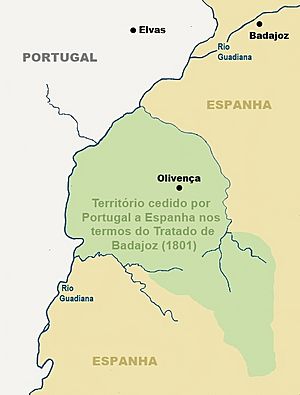
Because Olivença is surrounded by Spanish areas and separated from Portugal by the Guadiana river, its Portuguese developed its own special features. It became a subdialect of Alentejan Portuguese, which is spoken in a region of Portugal.
Olivença and Táliga in Spain
After a conflict called the War of the Oranges in 1801, Portugal lost Olivença and Táliga to Spain. Portugal still argues that Spain should have given them back after the Congress of Vienna, but Spain continues to control the area.
Portuguese was the main language for people in Olivença until the mid-1900s. Then, it started to fade away. This was partly because of policies under Franco's government that pushed for everyone to speak Spanish. Schools also stopped teaching Portuguese. Today, Portuguese is taught, but only as a foreign language.
How Oliventine Portuguese Sounds
Oliventine Portuguese is a subdialect of Alentejan Portuguese. This means it's part of the group of southern Portuguese dialects. You can hear the influence of Spanish in some of its sounds and words.
Here are a few ways it's different:
- Sometimes, the sound "ou" in standard Portuguese becomes "ô" in Oliventine. For example, "ouro" (gold) becomes "ôro".
- The ending "e" sound can become "i". For example, "fome" (hunger) becomes "fomi".
- The "ei" sound can become "ê". For example, "galinheiro" (chicken coop) becomes "galinhêro".
- People might say "casteyanos" instead of "castelhanos" (Castilians).
- It uses some Spanish words, like "coche" (car) instead of the Portuguese "carro", and "ancho" (wide) instead of "largo".
Special Grammar Rules
Oliventine Portuguese has some unique grammar rules, often showing Spanish influence:
- When saying "by the" (like "por o"), some speakers keep the words separate, while in standard Portuguese, they usually join them (like "pelo").
- The word "não" (no) can sometimes blend with the next word if it starts with a vowel. For example, "não havia" (there wasn't) might become "n'havia".
Unique Sounds
The way words are pronounced in Oliventine Portuguese can be different from standard Portuguese.
- Sometimes, the "a" sound can change to "e" in certain words, especially in the Alentejo region.
- The "e" sound can become "u" if it's followed by certain letters.
- Some words might have a nasal sound (like speaking through your nose) that isn't in standard Portuguese.
- The "e" at the end of a word is often pronounced like an "i". For example, "cidades" (cities) sounds like "cidadis".
- The "eu" sound can become just "ê". For example, "Europa" (Europe) might sound like "Êropa".
- The word "não" (no) can sometimes be shortened to "nã".
The Language Today
Portuguese Rule
When Portugal controlled Olivença, Portuguese was the official language. It was used in government and encouraged for everyone. The way people spoke Portuguese in Olivença followed the rules set by the Lisbon Academy of Sciences.
After the Orange Wars
Even after Spain took over in 1801, most people in Olivença continued to speak Portuguese. It was passed down from parents to children for many years, almost until the 1940s.
Franco's Time
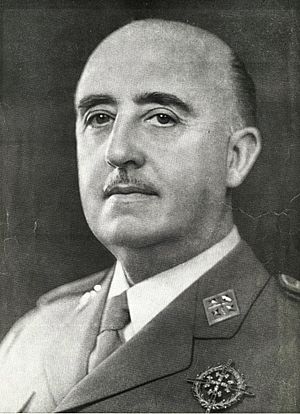
In the 1940s and 1950s, under Francisco Franco's government, Spain wanted everyone to speak only Spanish. Speaking Portuguese became unpopular and was seen as a language for people who weren't educated. It was even forbidden to speak Portuguese in some places. People were also told not to pray to traditional Portuguese saints.
Because of this, parents started speaking Spanish to their children instead of Portuguese. Schools also played a big part, as they taught children only in Spanish. Before, many young people worked in the fields and didn't go to school, which helped keep Portuguese culture alive. But with new schooling and mass media, the old Portuguese traditions started to disappear.
Modern Day
Since Spain became a democracy again, relations with Portugal have improved. People are more interested in Portuguese culture and old Portuguese buildings. However, some people still feel a bit hesitant about Portugal and its culture.
Today, only older people in Olivença speak Portuguese. Younger generations have grown up speaking and learning only Spanish. So, they use Spanish for everything in their daily lives.
Learning Portuguese
Portuguese is taught in Olivença and Táliga, but it's taught as a foreign language, not as a local language.
The Instituto Camões, a Portuguese government group, used to help fund projects to save Portuguese in the area. They also promoted Portuguese culture. Sadly, this support doesn't happen anymore.
In 2017, on Portugal Day, the first church service in Portuguese was held in Olivença since the 1840s, when it was banned.
Groups Helping Oliventine Portuguese
Several groups have worked to support the Portuguese language in Olivença and Táliga. They have collected important information and helped Portuguese speakers.
Instituto Camões
This is a Portuguese government organization that works to promote and protect the Portuguese language around the world. It used to pay for Portuguese classes and activities in Olivença, but it no longer provides money for these projects.
Além Guadiana
The Além Guadiana group started in 2008. They organize events and programs to help keep the language alive in Olivença. They also collect stories and songs from the last Portuguese speakers in the town.
Their main goal is to create a sound library with recordings of these older speakers. This way, they can save the proverbs, stories, and songs that tell the recent history of Olivença.
Grupo dos Amigos de Olivença
The Grupo dos Amigos de Olivença is a Portuguese group that wants Olivença to be part of Portugal again. They have pushed the Portuguese government to help teach the Portuguese language in Olivença.
See also
 In Spanish: Portugués oliventino para niños
In Spanish: Portugués oliventino para niños



